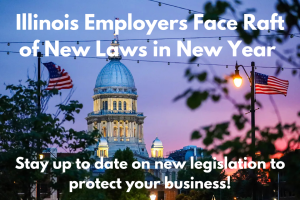Guest Author: Kelsey Feucht, Associate Attorney with Bellas & Wachowski
Illinois small businesses need to get up to speed on a variety of state legislation – particularly employment laws – which became effective on January 1.
Key new laws (or amendments to existing legislation) covered such topics as employer meetings during which political or religious views are voiced, inclusion of specific wage or salary information in job postings, restrictions on the employment of minors, and new limitations on non-solicitation and non-compete agreements.
Among these new provisions:
The Worker Freedom of Speech Act, which prohibits so-called “captive audience meetings” at which an employer requires attendance—under threat of disciplinary actions of some kind—so they can express political or religious opinions. The law does not prevent such meetings from being held at all. This law has been challenged in court on free speech grounds.
An amendment to the Illinois Equal Pay Act requires employers with 15 or more workers to publish “pay scale and benefits” information in all job postings from positions that either will be at least partially performed in the state, and/or report to a supervisor or work location in the state. The listings must include a wage or salary amount or range, along with a broad description of benefits—the details are left somewhat vague—and other compensation like stock options. Employers must make such opportunities available to existing employees with internal postings made within 14 days of an external posting. Employees are empowered to file anonymous complaints with the Illinois Department of Labor if they believe these provisions have not been followed, and they have up to a year from the date of the alleged violation. Employers should establish clear guidelines for pay scales and revise job posting templates accordingly.
The Child Labor Law of 2024, a top-to-bottom rewrite of the Illinois Child Labor Law, which holds that children under 16 cannot be employed without an authorizing certificate from their school. With certain exceptions, minors cannot, when school is in session, work more than 18 hours in a week, after 7 p.m. or before 7 a.m., or more than three hours per day or eight hours of total work and school hours. When school is not in session, they still may not work more than 40 hours in a week, between 9 p.m. and 7 a.m., more than eight hours in a 24-hour period, or more than five consecutive hours within at least a 30-minute meal break. They also must have a supervisor at least 21 years of age. Employers should implement new processes or procedures, or adjust existing ones, to ensure compliance with these specifications.
Two amendments to the Illinois Freedom to Work Act, one of which bans non-competes for licensed mental health professionals who serve veterans and first responders; and the other of which bans non-compete and non-solicitation agreements with construction workers, whether or not they are under a collective bargaining agreement. Two other proposed amendment to the Act would have banned or significantly limited restrictive covenants altogether, but these did not pass.
Several other new laws for 2025 that impact small businesses will be covered in a second post next week. If you need guidance on any of these provisions, please contact one of the experienced attorneys of Bellas & Wa;chowski.
 Chicago Business Attorney Blog
Chicago Business Attorney Blog


